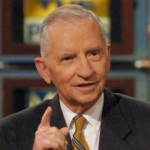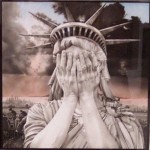As most everyone knows, I like statistics. In fact, some would say that I "love" statistics. I'm not sure I would go that far, but I certainly believe there's a lot that we can garner from the proper interpretation of polls and surveys as long as they are relatively current, include a reasonably diverse and adequate sample, the questions and their responses are clear and unambiguous, and that we take them with a grain or two of salt.
After all, most people don't like to be bothered and there are those who may fib (or outright lie) which, of course, skews the entire survey (hence the "plus or minus" or "margin of error" disclaimer).
The reason I mention this is pretty simple. I recently watched a television show which discussed American's opinions of the two corporate sponsored Democrat and Republican candidates and America's failed political system (as most everyone knows, but may not understand, the U.S. is now a de facto corporate Oligarchy and no longer a Constitutional or democratic republic).
The show went on to discuss the state of the economy, the rise in (manufactured) racial tensions, our economic/military involvement overseas, quality of education, and so forth. This made me wonder what, statistically, we Americans thought about these issues (the reason I chose a statistical measure was it would be easier to quantify and explain in simple English).
So, just what do Americans think of America? According to a Pew Research Poll from June of 2014, a slight majority of Americans, 49%, thought our best days are behind while 44% thought we still have good days ahead of us. Not surprisingly, those who believed our best days were in the rear view mirror were mostly conservatives; specifically 76% of Far Right conservatives.
So, just what do Americans think of America? According to a Pew Research Poll from June of 2014, a slight majority of Americans, 49%, thought our best days are behind while 44% thought we still have good days ahead of us. Not surprisingly, those who believed our best days were in the rear view mirror were mostly conservatives; specifically 76% of Far Right conservatives.
Among business conservatives, it was 59%. Among the remnant of the Middle Class, either those slightly Left or Right of Center, approximately 60% were pessimistic about the future. Where we saw a switch was among the Left such as the Millennials, where 65% were optimistic about the future. Among the Left, Religious Left and Far Left, that number ranged from 50% to 70%. Is this simply youthful idealism or the cynical perspective that often comes with age? Remember, many, if not most, of those on the Right who responded were once the wild eyed youth of the 50's, 60's and 70's.
When the question was slightly changed, and the respondents were asked if America is the greatest nation what would you think their answers were? Well, intuitively, most of us would expect that they would follow along the same lines as outlined above, and we would be mostly correct. Among all groups, 28% said that America was the great nation on Earth while 58% said we were one among the several great counties.
When this was broken down, hardcore conservatives, including the Far Right, 92% said that if we weren't the best, we were among the best. Among just business conservatives that number rose to 98%! However, things changed radically when looking at the middle segment, where a significant majority said America was among the best but certainly not the best.
We got a similar response among the Millennials and the traditional Left/religious Left at 67% and 51% respectively while the hardcore Left agreed at 71% with 16% saying that there were other countries ahead of the U.S. A related question asked why America has been successful, 51% said it was our ability to adapt while 44% thought it was our willingness to stand by our principles.
Again, as expected, the numbers broke down along ideological lines with Conservatives of all stripes leaning toward standing by our principles, the flustered Middle nearly equally spit, and the Left arguing that it was our ability to adapt and change. What do you think? What had been our key to success over the last 200 or so years? The poll went on to discuss a wide variety of other related subjects---16 pages in all---which I will spare you, but if you have an interest in the subject, the link to the poll is below.
Nevertheless, this got me to wondering what Americans thought of the current political situation. It's no big secret that Americans across the political spectrum believe the political system is broken beyond repair. Even with the slanted news coming from the corporate media, we know that the political system is blatantly rigged and that both of the two major political parties, along with media, is bought and paid for by the corporate and financial elites; we are a de facto corporate Oligarchy after all.
Nevertheless, this got me to wondering what Americans thought of the current political situation. It's no big secret that Americans across the political spectrum believe the political system is broken beyond repair. Even with the slanted news coming from the corporate media, we know that the political system is blatantly rigged and that both of the two major political parties, along with media, is bought and paid for by the corporate and financial elites; we are a de facto corporate Oligarchy after all.
We routinely see the mask of legitimacy dropped on both sides without apology. Both of the two selected presidential candidates, Donald Trump and Hillary Clinton, are without question the worse candidates we have seen in decades if not ever. We've got from scraping the bottom of the barrel to scraping underneath the barrel. The majority of Americans strongly dislike either "choice", and yet both corporate parties and their media counterparts have worked hard to exclude, ignore, and belittle any other candidates and/or their political parties.
Ever since Ross Perot ran for President, both parties have cooperated to exclude any and all third party or independent candidates (even though independents are by far the largest political bloc (43%) in the country) both parties and the media behave as if the Democrat or Republican nominee is our only choice. I
Ever since Ross Perot ran for President, both parties have cooperated to exclude any and all third party or independent candidates (even though independents are by far the largest political bloc (43%) in the country) both parties and the media behave as if the Democrat or Republican nominee is our only choice. I
n fact, the largest demographic voting bloc in the country is the Millennials; the majority of whom are independent, and that number continues to grow. I suspect that will prove to be a fatal error for both parties and the elites. When polled, Gallup learned that 57% of those polled thought we needed a third party (which would include independent candidates).
Interesting, over half of registered Republicans (the GOP is third in registration behind Indies and Democrats) supported the notion of a third party while 43% of Democrats and 73% of independents supported a third party or independent candidate(s). In the current presidential race, Libertarian Party candidate Gary Johnson is polling around 12% while Green Party nominee Jill Stein is hovering around 9%; either way, these are some pretty high numbers considering their lack of exposure (thanks to the corporate enforced media blackout) and slim campaign dollars (again, the Oligarchy controls the flow of "big money" in politics as you know ever since the Supreme Court's "Citizens United" mistake which said money was "free speech" and corporations were "people", these legally created "Frankensteins" were permitted to unlimited "speech" while we were left mostly mute).
However, more recently (historically speaking), Theodore Roosevelt, who bolted from the Republican Party, ran under the Progressive Party label (more popularly known as the "Bull Moose Party") in 1912. Teddy garnered the largest percentage up to that point, 27.4% while the GOP incumbent and party nominee, William Howard Taft, received only 23.2% and Socialist Party candidate Eugene V. Debs got 6%.
However, Taft and Roosevelt split the vote, which allowed Democrat Woodrow Wilson to win with 41.8%. Fast forward to 1992, we had Ross Perot run as an Independent. Perot drew support from across the political spectrum, earning 20% of the liberal vote, 27% from conservatives, and a whopping 53% from moderates!
Economically, the majority of Perot's base were those in the middle class bracket (57%) and the rest mainly from the upper middle class (29%). In June of 1992, Perot was polling at 39% of potential voters. In the presidential debates (then hosted by the League of Women Voters), Perot blew Democratic candidate Bill Clinton and Republican candidate George H. Bush out of the water.
Though Perot ended up with 18% of the overall vote, exit polls would show that Perot took 38% of both Bush's and Clinton's supporters while most of the remainder had intended on staying home until Perot entered the race. In 1996, Perot had formed the Reform Party and made another run at it, but due to internal squabbles and what some called a "personal meltdown", failed to do as well, although still respectable.
Voters today are clearly dissatisfied with both corporate party nominees, and for that matter, with Congress and the Supreme Court. Approval ratings for all branches of the government have been setting new lows for years (according to a 2016 Rasmussen survey, Congress has a 11% approval rating compared to 86% who give Congress a failing grade).
Voters today are clearly dissatisfied with both corporate party nominees, and for that matter, with Congress and the Supreme Court. Approval ratings for all branches of the government have been setting new lows for years (according to a 2016 Rasmussen survey, Congress has a 11% approval rating compared to 86% who give Congress a failing grade).
The majority of Americans have come to accept that the system that we once knew is gone and not likely to return anytime soon. About two years ago, a prominent academic study revealed what most of us already knew, that the government bequest to us by our Founding Fathers had been squandered away, mainly by its beneficiaries and guardians---us. In its place is an Oligarchy comprised of a corporate and financial elite.
We have witnessed a two tiered economic and judicial system, open and very public abuse of the system and corruption, and use of our military for the economic benefit of a tiny few, increased surveillance, rigged voting, militarization of the police, manipulation of the news and public opinion, manufactured protests and riots, and so forth.
There is a complete and total disconnect between the People and the Government (including the two corporate political parties) that is beyond repair (only 28% of Americans think we're headed in the right direction. Not what the news media or politicians would have you to believe is it?
There is a complete and total disconnect between the People and the Government (including the two corporate political parties) that is beyond repair (only 28% of Americans think we're headed in the right direction. Not what the news media or politicians would have you to believe is it?
Remember too that revolutions tend to occur when public disapproval reaches just 1/4 of the population. We're obviously far past that number and have been for years if not decades ). It's time for the American People to put aside the media created distractions and manufactured differences and focus our attention on the real source of troubles. Perhaps then we can restore America as it should be. It won't be easy, but nothing worthwhile is ever easy is it? So, what do you think America, is this country still worth fighting for?
If you enjoyed the article, please consider passing it along to others and don't forget to subscribe. It's free! Lastly please be sure to "like" us on whatever platform you use to read anotheropinionblog.com. It helps with the algorithms and keeps our articles in circulation. Thank you!
Pew Research Center: Red vs. Blue: The Political Typology
http://www.people-press.org/2014/06/26/section-2-views-of-the-nation-the-constitution-and-government/
Americans' Desire for Third Party Persists This Election Year
Rasmussen Reports: Congressional Performance
Pew Research Center: Red vs. Blue: The Political Typology
http://www.people-press.org/2014/06/26/section-2-views-of-the-nation-the-constitution-and-government/
Americans' Desire for Third Party Persists This Election Year
Rasmussen Reports: Congressional Performance



No comments:
Post a Comment